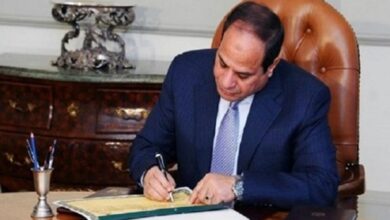Prominent businessman and president of the liberal opposition Wafd party el-Sayed el-Badawy has expanded his media empire by buying the independent newspaper Al-Dostour, in a bid to enhance his party’s chances in the upcoming parliamentary and presidential elections.
Al-Dostour Executive Editor Ibrahim Mansour said Monday that el-Badawy signed the acquisition agreement with Ahmed Essam Fahmy, the newspaper publisher, after two months of negotiations
Sources at Al-Dostour said el-Badawy paid LE16 million to acquire both the daily and weekly editions of the newspaper which was established in 1995.
Mansour told Al-Masry Al-Youm that under the agreement, the new buyer will maintain the same editorial policy and retain all the current editors.
In a press statement, Al-Dostour announced that Coptic businessman Edward Reda is one of the new shareholders.
El-Badawy was quoted in the statement as saying he is keen to "maintain the paper as one of the most important platforms of freedom, courage and independent opinion.”
The purchase of Al-Dostour, one of Egypt’s leading dissident newspapers, is seen as another step in el-Badawy's plans to revive his party since he was elected as its new leader in May.
El-Badawy, 60, has recently managed to attract a number of prominent public figures to his party, such as poet Ahmed Fouad Nigm, preacher Soad Saleh and business tycoon Ramy Lakah.
El-Badawy has also expressed his willingness to cooperate with the Muslim Brotherhood, Egypt’s strongest opposition movement.
Director of the Center for Middle East Studies Ammar Ali Hassan said el-Badawy seeks to enhance the popularity of the Wafd Party through the purchase of the newspaper.
“He is trying to promote his party by attracting Al-Dostour’s audience,” Hassan told Al-Masry Al-Youm.
Al-Dostour ranks fifth among Egypt's dailies in terms of circulation, after Al-Ahram, Al-Masry Al-Youm, Al-Akhbar and Al-Gomhoriya. The newspaper's daily edition sells 45,000 to 55,000 copies, while its weekly sells 85,000. The paper is known for its harsh criticism of Egyptian President Hosni Mubarak, particularly through its Chief Editor Ibrahim Eissa’s op-eds. Eissa was sentenced to six months in prison in 2008 for publishing "false information” about Mubarak's deteriorating health, but was later pardoned by the president.
Although el-Badawy owns Egypt’s biggest private television network, al-Hayat, he has consistently refrained from using his satellite channels to market his political ambitions.
“Everyone knows the limitations imposed on television stations in Egypt,” Hassan said. “With the new deal, he now has more room for political maneuvering.”
Some also believe the new deal might result in less critical paper, voicing concerns that el-Badawy might try to tone down the paper’s radical stance as part of a backroom deal with the regime.
“We are really worried that our editorial policy will be softened,” an editor of al-Dostour told Al-Masry Al-Youm on condition of anonymity. Experts, for their part, have not ruled out such a possibility.
“It’s always probable that el-Badawy might push for a change in the paper, especially if he plans to emerge as the country’s strongest opposition block in the next parliamentary elections,” Hassan warned.
Several political experts have suggested that the Wafd Party may make a secret deal with the ruling National Democratic Party ahead of the upcoming parliamentary elections, slated for late November. Such a move, they say, would be intended to undermine the Brotherhood's electoral chances by granting weaker secular opposition parties more seats in the parliament.
In 2005, Egypt’s secular opposition parties together managed to obtain 14 seats, less than one percent of the parliament’s 454 seats. By contrast, the Muslim Brotherhood received 88 seats.
Around 200 members of the Wafd party have expressed interest in running in the upcoming elections. The party's ruling board intends to choose 125 candidates by 7 September.




